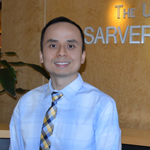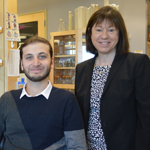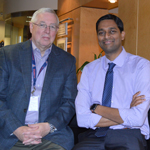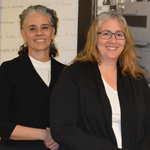The generosity of private donors, through a variety of generous gifts, enabled the University of Arizona Sarver Heart Center to grant five Investigator Awards for the 2017-2018 academic year.
“These awards help research scientists advance our knowledge and develop data used to compete nationally for larger grants to further pursue cutting-edge research,” said Nancy K. Sweitzer, MD, PhD, director of the UA Sarver Heart Center. “This year, funded studies will cover improving cardiac arrest survival, understanding how sleep problems impact risk of sudden cardiac death, preserving heart muscle for heart attack patients, expanding our knowledge of the molecular mechanisms of heart muscle function and how congenital heart conditions affect neurological development in pediatric patients.”
“We had so many fantastic proposals to choose from, I am very interested in growing the funding available for this critical Investigator Awards program, which is unique and makes the Sarver Heart Center an incredibly attractive place for young, creative and innovative faculty. Growing these donations clearly will be a priority in the coming years,” added Dr. Sweitzer. Sarver Heart Center’s goal is to expand cardiovascular research opportunities in basic sciences as well as clinical advances. For information on how you can support heart research, please visit heart.arizona.edu/giving.
 Michael Grandner, PhD, Assistant professor of psychiatry, was awarded a $25,000 grant, funded by the Steven M. Gootter Foundation, to study “Sleep and Risk Factors for Sudden Cardiac Death.” Dr. Grandner will examine the role of insufficient sleep as a risk factor (or risk marker) for sudden cardiac death (SCD), beginning with the relationship between sleep duration and behavioral and SCD medical risk factors in a large, nationally representative dataset of more than 800,000 adults in the United States. This will be one of the largest studies of sleep duration, relative to cardiovascular risk factors, to date. Next, Dr. Grandner’s research group will collaborate with University of Arizona athletic department to study sleep as it relates to SCD risk among elite athletes, focusing on UA student athletes. Incoming student athletes are screened routinely for cardiac abnormalities.
Michael Grandner, PhD, Assistant professor of psychiatry, was awarded a $25,000 grant, funded by the Steven M. Gootter Foundation, to study “Sleep and Risk Factors for Sudden Cardiac Death.” Dr. Grandner will examine the role of insufficient sleep as a risk factor (or risk marker) for sudden cardiac death (SCD), beginning with the relationship between sleep duration and behavioral and SCD medical risk factors in a large, nationally representative dataset of more than 800,000 adults in the United States. This will be one of the largest studies of sleep duration, relative to cardiovascular risk factors, to date. Next, Dr. Grandner’s research group will collaborate with University of Arizona athletic department to study sleep as it relates to SCD risk among elite athletes, focusing on UA student athletes. Incoming student athletes are screened routinely for cardiac abnormalities.
Dr. Grandner’s study adds sleep screening measures to routine pre-performance assessment to examine associations between cardiac findings and baseline sleep disturbances. Athletes with potential positive findings on screening will be evaluated using a more in-depth sleep protocol, including at-home measures of 24-hour sleep-wake patterns, heart-rate patterns and sleep-stage data collected in the home. This will be the first-ever study of sleep and circadian factors relative to SCD risk outside of traditional behavioral risk factors, and the first such study in athletes.
 In a study to improve cardiac arrest survivors’ outcomes post-resuscitation, Huu Tam Truong, MD, was awarded $25,000 to study “A Novel Anti-inflammatory Peptide Ang-(1-7) for Preserving Both Neurological and Myocardial Function Following Prolonged VF Cardiac Arrest.” The goal is to improve long-term, neurologically intact survival after out-of-hospital cardiac arrest caused by ventricular fibrillation (VFCA).
In a study to improve cardiac arrest survivors’ outcomes post-resuscitation, Huu Tam Truong, MD, was awarded $25,000 to study “A Novel Anti-inflammatory Peptide Ang-(1-7) for Preserving Both Neurological and Myocardial Function Following Prolonged VF Cardiac Arrest.” The goal is to improve long-term, neurologically intact survival after out-of-hospital cardiac arrest caused by ventricular fibrillation (VFCA).
A new and promising anti-inflammatory therapeutic peptide, Ang-(1-7), improves central nervous system (CNS) function, particularly cognitive function, in heart failure laboratory models. Dr. Truong will collaborate with Karl B. Kern, MD, his research mentor, who heads the UA Sarver Heart Center Resuscitation Research Group, to test the efficacy of Ang-(1-7) as a mechanism for preserving both CNS and myocardial function following prolonged VFCA. If successful, this agent will provide a new therapeutic approach to accomplishing the Resuscitation Research Group’s goal of improved outcomes from cardiac arrest.
Dr. Kern said, “I have led our translational laboratory investigating resuscitation science for nearly 30 years. We have made some remarkable discoveries that literally have changed the way we clinically treat cardiac arrest today. I believe post-resuscitation care is the next real opportunity to further improve long-term outcomes from sudden cardiac arrest, including favorable neurological outcomes of those fortunate enough to be resuscitated.”
 Mert Colpan, PhD, postdoctoral research associate in the Molecular Cardiovascular Research Program, was awarded $20,000 from the Marjorie Hornbeck Memorial Award and anonymous donors supporting heart failure research. Carol Gregorio, PhD, vice dean for innovation and development for the UA College of Medicine – Tucson and co-director of the UA Sarver Heart Center, is Dr. Colpan’s mentor for the study, “Identifying the Role of Adenylyl Cyclase-associated Protein 2 in Cardiac Muscle.”
Mert Colpan, PhD, postdoctoral research associate in the Molecular Cardiovascular Research Program, was awarded $20,000 from the Marjorie Hornbeck Memorial Award and anonymous donors supporting heart failure research. Carol Gregorio, PhD, vice dean for innovation and development for the UA College of Medicine – Tucson and co-director of the UA Sarver Heart Center, is Dr. Colpan’s mentor for the study, “Identifying the Role of Adenylyl Cyclase-associated Protein 2 in Cardiac Muscle.”
The heart muscle contracts because of the force generated when adjacent thin and thick filaments in striated muscle slide against each other. The precise lengths of thin filaments are essential since alterations result in cardiac abnormalities, such as dilated cardiomyopathy (DCM). Thin filament lengths in the heart are regulated predominantly from their pointed ends. Recently, adenylyl cyclase-associated protein 2 (CAP2) was found to localize close to thin filament pointed ends in the heart. Human patients lacking the CAP2 gene tend to develop heart defects and DCM, but the precise role CAP2 plays in heart muscle remains unknown. The goal of Dr. Colpan’s proposal is to understand CAP2 better and learn how improper regulation of thin filament length by CAP2 leads to dysfunction of the heart.
 Madhan Sundaram, MD (right), was awarded $15,000 to study whether heart attack patients would benefit from therapeutic hypothermia (cooling) before a cardiology catheterization procedure is done to restore normal blood flow to the heart. When a patient has a heart attack caused by a blockage of the arteries, emergency responders, including paramedics, emergency department and cardiology staff, work to get the artery open in the cardiology catheterization lab within 90 minutes or less, or 120 minutes when hospital-to-hospital transfer is required.
Madhan Sundaram, MD (right), was awarded $15,000 to study whether heart attack patients would benefit from therapeutic hypothermia (cooling) before a cardiology catheterization procedure is done to restore normal blood flow to the heart. When a patient has a heart attack caused by a blockage of the arteries, emergency responders, including paramedics, emergency department and cardiology staff, work to get the artery open in the cardiology catheterization lab within 90 minutes or less, or 120 minutes when hospital-to-hospital transfer is required.
Unfortunately, logistics – transportation from remote areas in a state like Arizona, for example – can prevent some patients from receiving this treatment within the recommended timeframe. In such cases, patients are given “clot-busting” drugs intravenously to improve blood flow. Dr. Sundaram, in collaboration with his mentor, Dr. Karl B. Kern (left), will study in the Resuscitation Research Lab whether therapeutic cooling administered intravenously would “buy time” for patients while reducing bleeding risks associated with the current standard clot therapy. The study also will assess if cooling the patient would reduce loss of heart muscle, maintain heart function and improve survival. “This new approach could result in a totally new paradigm for patients living in areas outside the typical geographic boundaries for timely access to a cath lab,” said Dr. Sundaram.
 Jennifer Andrews, PhD (right), assistant professor of pediatrics, received the William “Billy” Gieszl Pediatric/Congenital Heart Disease Award in the amount of $14,700 to develop a “Neurocognitive and Psychosocial Profile of Adolescents and Adults with Congenital Heart Disease (CHD).” Scott Klewer, MD, professor of pediatric cardiology, and Michael Seckeler, MD, MSc, associate professor of pediatric cardiology, are her mentors for the project. Dr. Klewer and Sydney Rice, MD, MS (left), associate professor of developmental pediatrics, are collaborating with Dr. Andrews on this project. People born with CHD are at persistent risk for neurodevelopmental disabilities. This project will fill a critical gap in knowledge and generate pilot results needed to fund a larger study with the capacity to change care of these patients.
Jennifer Andrews, PhD (right), assistant professor of pediatrics, received the William “Billy” Gieszl Pediatric/Congenital Heart Disease Award in the amount of $14,700 to develop a “Neurocognitive and Psychosocial Profile of Adolescents and Adults with Congenital Heart Disease (CHD).” Scott Klewer, MD, professor of pediatric cardiology, and Michael Seckeler, MD, MSc, associate professor of pediatric cardiology, are her mentors for the project. Dr. Klewer and Sydney Rice, MD, MS (left), associate professor of developmental pediatrics, are collaborating with Dr. Andrews on this project. People born with CHD are at persistent risk for neurodevelopmental disabilities. This project will fill a critical gap in knowledge and generate pilot results needed to fund a larger study with the capacity to change care of these patients.

